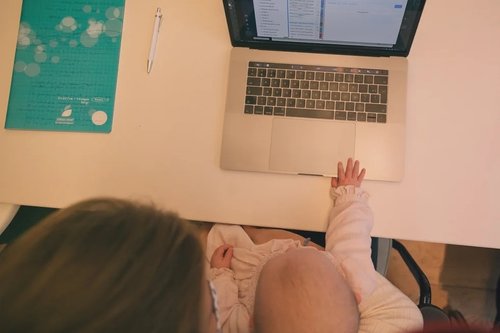It’s time to say goodbye to vacation guilt
03. 7. 2024
5 min.


Vikki is a freelance writer and CEO of Time Hackers, which helps individuals and teams achieve more, faster, without working longer hours. She also hosts the top 1% “Hack Your Time” podcast. She’s based in Manchester and is a toddler mum.
We all know this feeling: relaxing on vacation, sipping on an iced coffee, watching the world go by when suddenly… You remember the team meeting that is happening without you, the deadline you failed to meet before you left the office, or your colleague who is managing a project solo while you’re out. Just like that, your heart rate rises, anxiety sets in and you pick up your phone to check work emails for the third time that day, “just in case” something urgent has happened.
Inevitably, you find yourself in a classic “to respond, or not to respond” dilemma, wondering if it’s even worth going on vacation if you’re going to spend your me-time thinking about work. With that in mind, it’s no surprise that over 46% of Americans don’t take full advantage of their allocated PTO, with 49% of people working at least one hour a day on vacation. So, what’s behind this struggle to take real time off, and enjoy a guilt-free vacation?
Blame it on the Man
Unless organizations are intentionally building a culture that supports and promotes taking vacation time, our default culture as a society is still one that equates business to productivity. This manifests in how managers communicate with their team when it comes to PTO, often setting a bad example by not taking their own time off. One recent study found that 12% of managers were going as far as actively discouraging their teams from taking time off. This leaves employees feeling “bad” for taking their vacation days, and so even when they do take them, they will internalize the feeling that they’re doing something wrong. Hello, guilt!
The rise of hustle culture
Search #Hustle on Instagram and you’ll see it’s been used over 30 million times. In recent years society has celebrated hustling, nonstop work, and being available 24/7 so much that being on vacation leaves so many thinking that they are compromising success - even when they logically understand that rest and time off is productive. In a world where our livelihoods depend on our work, it can be hard to disconnect. Even when you scroll social media in your downtime you’ll be met with people humble bragging about their most productive moments and work wins that leave you wanting to curl up and hold your head low as you sneak back into the office with your post-vacation glow.
Job insecurity sows doubt
There’s mounting pressure to over-deliver in tough economic climates, which many are experiencing right now, and employers often lazily use time as a proxy for commitment and productivity. In this instance, taking time out of the office for a vacation can leave employees feeling vulnerable and unsafe in their career growth. Sadly, nearly 1 out of 5 workers are concerned that taking time off might hurt their opportunity for career advancement, while 16% fear they risk losing their jobs.
Let go of people-pleasing
The fear of letting others down, whether it means they will have to pick up our workload, we won’t be there to support them, or that we will delay projects by taking our time off often leads to vacation guilt. It’s human nature to care what other people think of us. That can hold us back when it comes to prioritizing wellness, even when we know the best thing we can do for our team is to set an example by taking our hard-earned PTO.
Other factors that drive our vacation guilt include cultural norms and family background. How we’ve been socialized and influenced by our peers, our education systems, and the media we engage with influences how we perceive taking time off. Our default mode when it comes to prioritizing ourselves is guilt. This is why companies that want to encourage workers to take vacation time and enjoy it have to intentionally build a culture that advocates for it, encourages managers to set an example and communicates positively on the subject.
The factors that contribute to vacation guilt can easily lead to an unsustainable work-life balance that goes beyond not being able to enjoy a vacation, from how people spend their evenings and weekends to how they show up in the office. They leave people at a higher risk of burnout, illness, and resignation. This is only compounded as people take less vacation time, or return stressed and anxious when they do take time off.
Don’t think, just do
If workers want to feel empowered enough to take a vacation without feeling guilty, the first thing they have to do is take the vacation, even if it comes with guilt. We cannot unlearn this guilt in theory, it happens in practice. It may be uncomfortable at first, but this is how you get to know yourself and start to tackle your fears around vacation time.
Approach your time off with curiosity as an opportunity to purge and explore your own guilt cycles and narratives that keep you from enjoying time outside of work. You will also get to know more about your coworkers, managers, and company in the process. It’s an exploratory mission, and there’s so much information you won’t learn if you wait to feel guilt-free before you book the trip.
Look at guilt as a dial, not an on/off button. During your time off, your vacations reflect on what helps you turn the dial down, celebrating the moments you don’t feel guilty, or the days you don’t check inboxes. Reward the behavior you want to see more of and celebrate yourself. This is how you motivate your brain to get on board with new behaviors that are in line with what you choose and go beyond what toxic cultures program us to think.
Set yourself up for success
There are also practical things you do to relieve stress or guilt while away from the office. For example, letting your team know in advance about your vacation, blocking off the entire day before you go to wrap things up and hand things over, and setting up your out-of-office email response. Mark your calendar as soon as your vacation is booked so people know you won’t be at meetings. This will allow you to manage expectations and allow other people to adjust accordingly.
Also, trust that other people are resourceful and responsible, they can figure things out or wait a few days for your return. We too often label work as “urgent” that is in fact, not. If your work is not saving lives, then your work can wait.
Another good tip is to remove the temptation to work on vacation. This could mean not bringing your laptop, deleting work apps from your phone, or turning on airplane mode for a few hours. Choose what boundaries you want to set and know that it is ok to build one step at a time.
Lastly, see yourself and your vacation as an example for others at your organization and in your community. Be the change you want to see in the world and lean into your desire to see more people enjoy guilt-free vacations.
Remember that the guilt you may feel is coming from unhealthy expectations, and the more opportunities you can give yourself to unplug from work and reconnect with your personal life, the more confident and capable you will feel. There’s more to life than meeting deadlines and turning in deliverables, so book your vacation and enjoy it. You’ve earned it.
Photo: Thomas Descamps for Welcome to the Jungle
Follow Welcome to the Jungle on Facebook, LinkedIn, and Instagram, and subscribe to our newsletter to get our latest articles every week!

Viac inšpirácie: Náš vzťah k práci

Young workers on unpaid internships: Was it worth it?
While internships build skills and connections, unpaid ones can limit opportunities for those who can't work for free. Is it fair?
12. 9. 2024

Sleeping less to succeed more: Do CEOs sleep as little as we think?
In today's fast-paced corporate world, a common belief is that successful leaders, particularly CEOs, need less sleep to achieve their goals.
26. 8. 2024

The do's and don'ts of working remotely on vacation
Can you truly combine work and vacation? With remote working becoming more popular, many are exploring their options.
18. 7. 2024

How working parents can set themselves up for success
Parenting is a balancing act no matter what, but how can you add work to the equation?
04. 7. 2024

Is talent the root of success at work?
Talent can take you far, but is it a substitute for hard work?
28. 5. 2024
Novinky, ktoré to vyriešia
Chcete držať krok s najnovšími článkami? Dvakrát týždenne môžete do svojej poštovej schránky dostávať zaujímavé príbehy, ponuky na práce a ďalšie tipy.

Hľadáte svoju ďalšiu pracovnú príležitosť?
Viac ako 200 000 kandidátov našlo prácu s Welcome to the Jungle
Preskúmať pracovné miesta